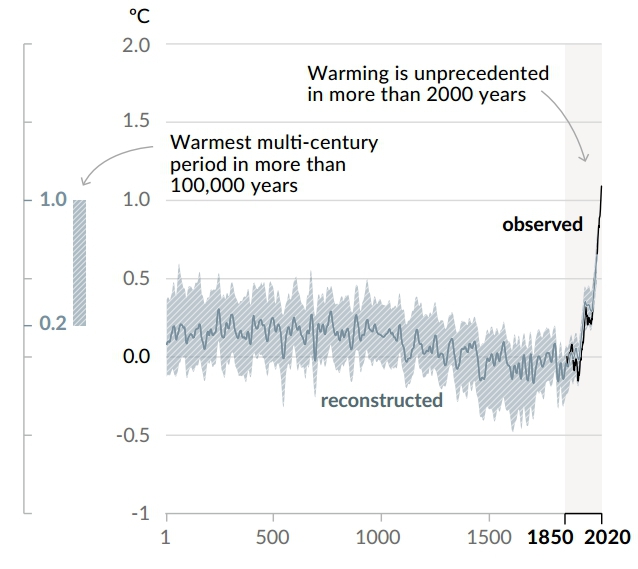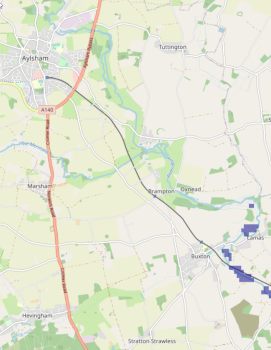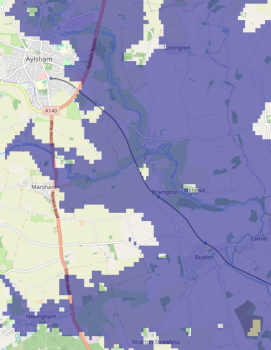Just as a major new report about the effects of global warming on our climate has been published by the UN’s Intergovernmental Panel on Climate Change (IPCC), it might be a good time to check out what this might mean for us mere mortals here near the lower right hand edge of the UK.
East Anglia if all the world’s ice melted
© OpenStreetMap contributors. ©2006-2018 Alex Tingle. NASA
There have been a growing number of warnings over the last 40 years or so that the world’s temperature is gradually increasing. Some people have argued that this could just be part of the normal long term rise and fall of global temperatures across the millennia.
Other people have said – and this includes most climate scientists – that the rise in temperature is too high and too fast for it to be anything other than an effect of human activity. The rise in temperature is caused, they argue, by all of us releasing ever increasing quantities of gasses (yes, those too!) such as carbon dioxide and methane which convert the earth’s atmosphere into a greenhouse trapping heat inside.

The ‘hockey stick’ chart showing a sudden rise in global temperature since 1850. From the Intergovernmental Panel on Climate Change (IPCC) Report: AR6 Climate Change 2021.
It is this latter view that most governments are now convinced about and are in the process of developing policy to reduce the amount of greenhouse gas released by burning fossil fuel, and a host of other things we do across the globe.
The problem is that the global climate and weather systems are so complicated to study and predict that saying how bad the problem could become, and how quickly, is open to considerable argument. More and more people are becoming convinced by the extremes of weather – enormous wild fires, fiercer storms, more rain and higher temperatures – being experienced in many countries.
But what’s to be done? The only clear message we have all been getting of late is to reduce our carbon releases into the atmosphere. It is still by no means clear what the effects of global temperature rise will have on us, including here in Tuttington.
We might expect warmer summers and cooler, wetter winters. That doesn’t sound too bad until you add in the other consequences of even a slight rise in our temperature. A warmer world will mean more of the polar ice and glacier ice will melt – a long way from us in rural Norfolk. But sea level rise will affect us because our county has so much land close to sea level; Tuttington is only about 20 metres above sea level after all.
Having a warmer climate will also likely mean an increase in the frequency of more violent winter storms and longer summer droughts. It will also change the types of pests and diseases affecting our crops and possibly us too.
And while we are scaring you all silly, it’s probably a good time to mention another possible scenario that has been predicted. This is that a higher global temperature might result in us getting a whole lot colder. Sounds strange? The UK is actually kept warmer than it should be by the gulf stream ocean current bringing up warm seawater from the Caribbean to surround us in balmy conditions while taking our colder water back to the south. The UK has the same latitude as Alaska so we should be colder than we are. As the Arctic ice and freshwater from glaciers melt, they dilute the warm water from the gulf stream with colder fresher water upsetting its flow and sending the warmth further south. This could result in the UK getting much colder while the south of Europe frazzles. There is some evidence that this process has already started.
Even climate scientists are not really sure quite what will happen and when. Most think that the more extreme changes could take many decades, hundreds or even thousands of years and the whole process could be slowed right down if we take rapid action to significantly reduce our carbon releases into the atmosphere. That’s a positive note having the knowledge that we can all do something to help.
The recently published IPCC Report on Global Warming has described some scenarios showing possible rises in sea level from the optimistic, if we manage to successfully reduce our carbon emissions, to the pessimistic, if we keep on pumping the stuff out in ever-increasing amounts.

Two scenarios for possible sea level rises by the year 2300. Left, less pessimistic, right, more pessimistic. From the Intergovernmental Panel on Climate Change (IPCC) Report: AR6 Climate Change 2021.
Our district in the year 2300 with a 3m rise in sea level, thought to be achievable if we control our carbon output.
Our district in the year 2300 with a sea level rise of 20m if we keep pumping out greenhouse gasses uncontrolled.
© OpenStreetMap contributors. ©2006-2018 Alex Tingle. NASA
The message seems clear, if the world continues with the good work now started – and we can all help with this – and further reduces the output of greenhouse gasses, we can limit the more severe impact of global warming.
If we ignore the clear signs of changes in our atmosphere and increase the accumulation of atmospheric carbon gasses in an uncontrolled manner then expect the unexpected and get your boat (or skis) ready. The more grim scenario will leave our descendants sunning themselves on the beaches of Thieves’ Lane or Heath Lane.


